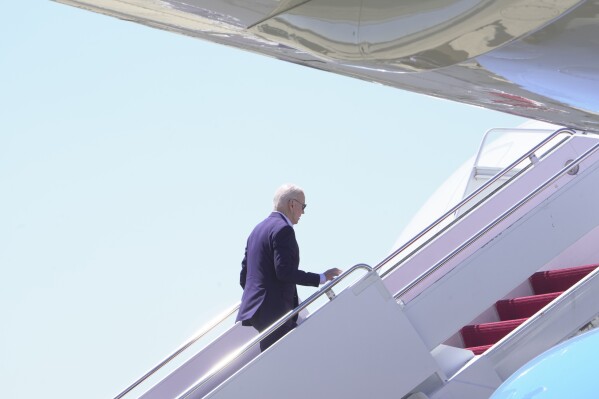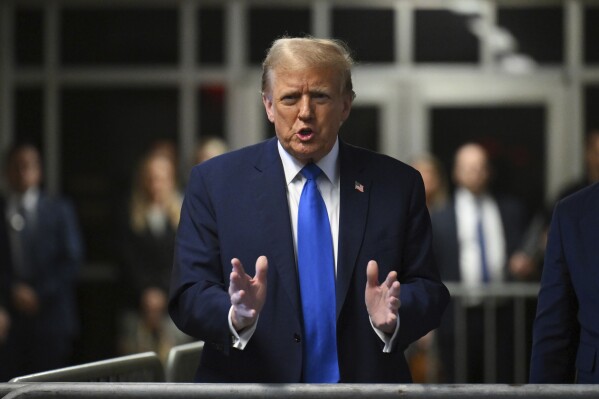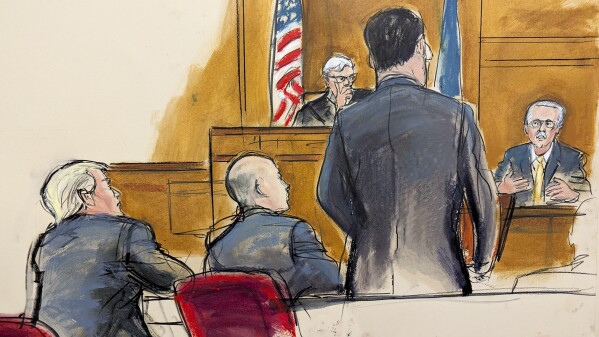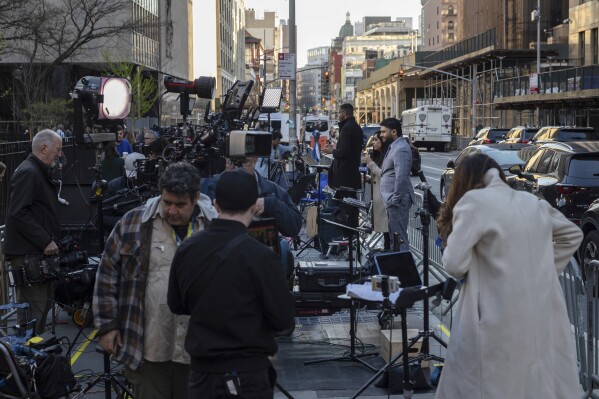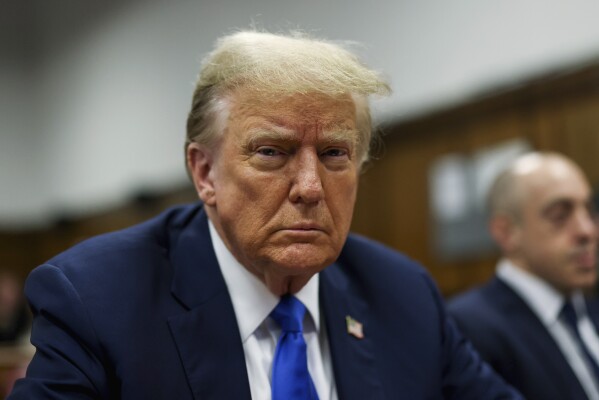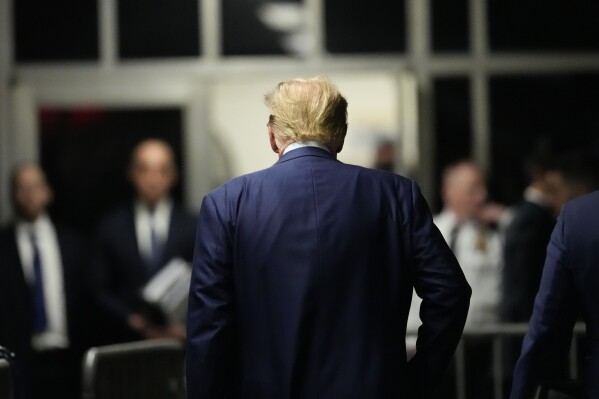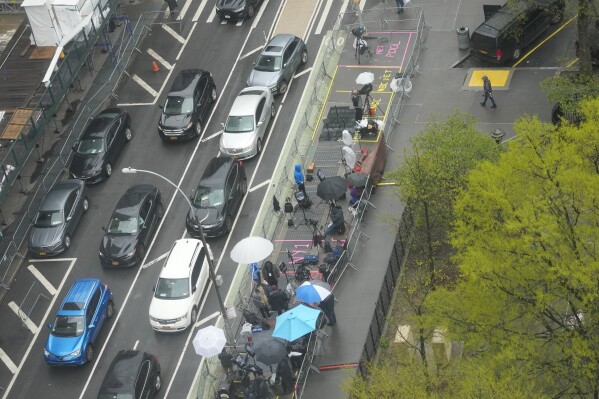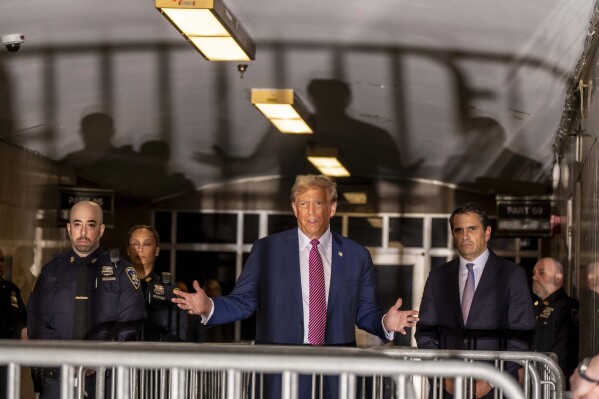Trump trial: Highlights from opening statements and first witness testimony
For the first time in history, prosecutors will present a criminal case against a former American president to a jury as they accuse Donald Trump of a hush money scheme aimed at preventing damaging stories about his personal life from becoming public.
Today’s live coverage has ended, but there’s still plenty to catch up on. Follow Tuesday’s live coverage as testimony resumes.
David Pecker was called as the first witness in Donald Trump‘s hush money trial following opening statements Monday.
For the first time in history, prosecutors presented a criminal case against a former American president to a jury, accusing Trump of a scheme to prevent damaging stories about his personal life from becoming public.
Here’s what to know:
- What the case is about: Trump is charged with 34 felony counts of falsifying business records as part of a scheme to bury stories that he feared could hurt his 2016 campaign.
- What was said in opening statements: The prosecution argued that Trump’s hush money payments were mislabeled as legal services. The defense said Trump had nothing to do with the payments.
- Why the trial isn’t televised: New York state law regarding media coverage of court proceedings is one of the most restrictive in the country, but some reporters, including from the AP, are allowed inside the courtroom.
As President Joe Biden returned from a weekend in Wilmington, Delaware, screens aboard Air Force One showed recaps of Trump’s trial, with images of the Republican challenger being broadcast by MSNBC. It was not clear if the volume was on or if the news was just playing in the background with the sound off.
Similarly, the televisions on Air Force Two were turned to CNN’s coverage of Trump’s trial as Vice President Kamala Harris traveled to Wisconsin earlier today.
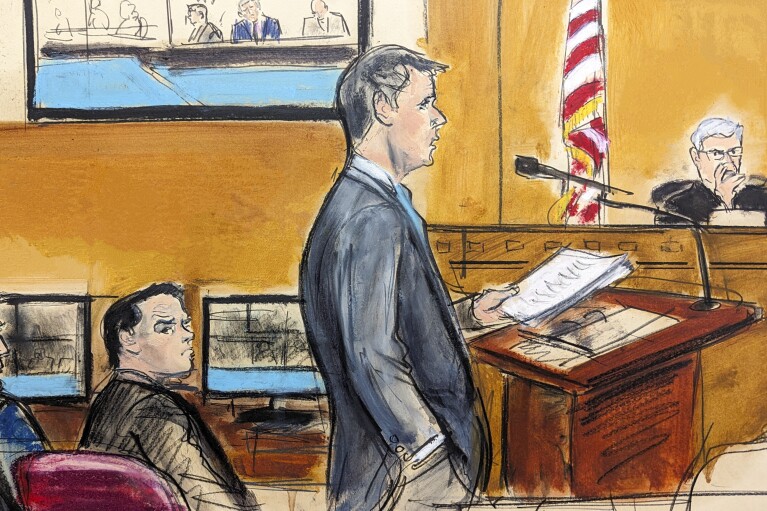
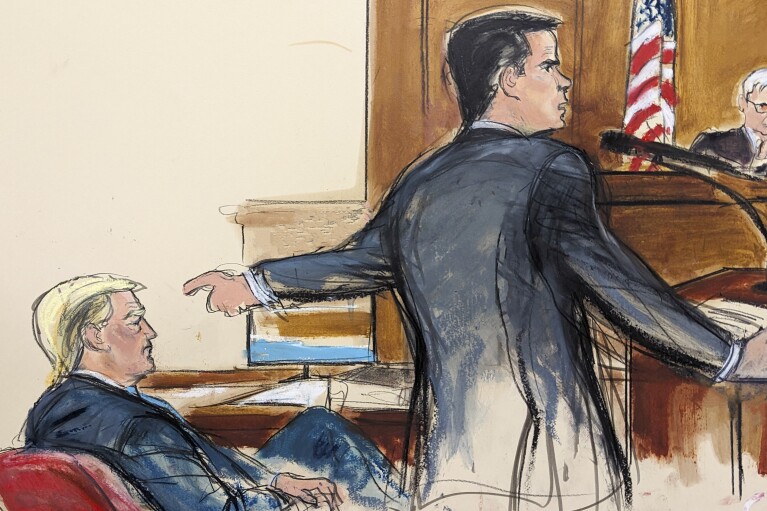
The opening statements offered the 12-person jury — and the voting public — radically divergent roadmaps for the first criminal trial of a former American president and the first of four prosecutions of Trump to reach a jury.
Befitting that history, prosecutors sought from the outset to elevate the gravity of the case, which they said was chiefly about election interference as reflected by the hush money payments to a porn actor who said she had a sexual encounter with Trump.
Todd Blanche, the defense lawyer, sought to preemptively undermine the credibility of prosecution witness Michael Cohen, who pleaded guilty to federal charges related to his role in the hush money scheme, as someone with an “obsession” with Trump who cannot be trusted.
Trump faces 34 felony counts of falsifying business records — a charge punishable by up to four years in prison — though it’s not clear if the judge would seek to put him behind bars. A conviction would not preclude Trump from becoming president again, but because it is a state case, he would not be able to pardon himself if found guilty. He has repeatedly denied any wrongdoing.
Trump has sought to turn his criminal defendant status into an asset for his campaign, fundraising off his legal jeopardy and repeatedly railing against a justice system that he has for years claimed is weaponized against him. In the weeks ahead, the case will test the jury’s ability to judge him impartially but also Trump’s ability to comply with courtroom protocol, including a gag order barring him from attacking witnesses.
In a nearby Manhattan civil court on Monday, state lawyers and an attorney for Trump settled their differences over a $175 million bond that Trump posted to block a large civil fraud judgment while he pursues appeals.
An attorney for the state said they wanted extra assurances because Trump had raised the money with help from a relatively small out-of-state insurance company.
As part of the deal struck Monday, lawyers for Trump and Knight Specialty Insurance Company agreed to keep the $175 million in a cash account that will gain interest but faces no downside risk.
The bond stops the state from potentially seizing Trump’s assets to satisfy the more than $454 million that he owes after Judge Arthur Engoron in February concluded that Trump and others had deceived banks and insurers by exaggerating his wealth on financial statements.
Trump railed against Engoron after his criminal trial wrapped for the day.
“He challenged the bonding company that maybe the bonding company was no good. Well, they’re good. And they also have $175 million of collateral — my collateral,” he said.
▶ Read more about Trump’s $175 million bond.
Before testimony resumes, Merchan will hold a hearing Tuesday morning on the prosecution’s request to hold Trump in contempt of court and fined at least $3,000 for allegedly violating his gag order by making social media posts about witnesses.
After court wraps for day 1 of testimony, Trump exited the court staring straight ahead and down, flanked by lawyers and others from his team.
“I’m the leading candidate ... and this is what they’re trying to take me off the trail for. Checks being paid to a lawyer,” he said to press gathered in the hallway outside. “It’s a case as to bookkeeping, which is a very minor thing.”
While courtroom access was restricted to a handful of reporters during jury selection, the start of opening statements has given members of the public a chance to witness the first criminal trial of a former president up close.
Roughly a dozen members of the public were allowed into the proceeding. Some had lined up before dawn to get their chance at witnessing history. But not everyone.
“I was planning on going to work, then as I was walking by, I saw all the police,” said Monroe Clinton, a programmer, who added that had not been following the trial closely. “I told my co-workers, ‘Hey I just saw the Trump trial is happening.’ The line was quite short, so I decided to go on in.”
Andrew Giuliani, the son of former New York City Mayor Rudy Giuliani and a former aide in the Trump administration, was seen waiting in line to get into the overflow room, a room adjacent to the main courtroom where the trial is being shown on monitors.
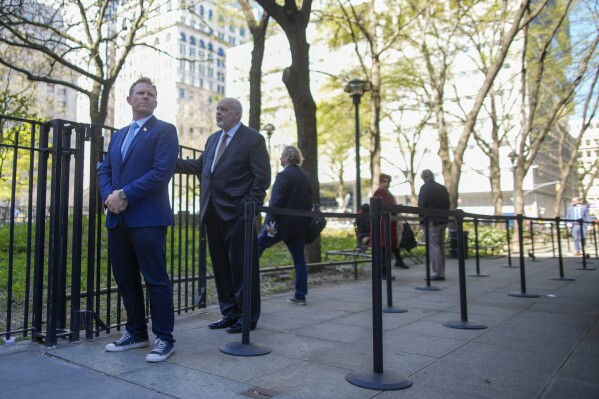
Andrew Giuliani, left, son of former New York City Mayor Rudy Giuliani, stands on line outside Manhattan criminal court building for a chance to get inside the courtroom to watch the proceedings in former President Donald Trump’s criminal trial, Monday, April 22, 2024, in New York. (AP Photo/Mary Altaffer)
An alternate juror has an emergency dental appointment this afternoon.
Tomorrow, Judge Merchan plans to end at 2 p.m. for the Passover holiday.
Most jurors looked straight ahead as they passed the defense table on the way out of the courtroom.
Pecker said former National Enquirer editor Dylan Howard is now living in Australia and, to his understanding, has a spinal condition that makes it impossible for him to travel internationally. (This appears to be a way of Steinglass explaining to jurors why Howard won’t be testifying, if indeed he doesn’t).
He’s the first person ever to testify at a criminal trial of a former U.S. president, and David Pecker is doing so under subpoena, with his lawyer in the courtroom.
But the weighty occasion still had a lighthearted moment. It came when a prosecutor asked Pecker to recite parts of phone numbers he’d had during the time period of the allegations from 2015 to about 2017, a question that might have been asked in order to authenticate phone records later on. After Pecker rattled off the closing digits of four different cell and office numbers from memory, prosecutor Joshua Steinglass assured him, “This isn’t a quiz.” Pecker responded with a cackling laugh.
Pecker is testifying about the National Enquirer’s use of “checkbook journalism,” a practice that entails paying a source for a story. Pecker said he “gave a number to the editors that they could not spend more than $10,000” on a story without getting his approval.
He went on to describe the publication’s coverage meetings — in which he had final say over celebrity stories — and his editorial philosophy. “The only thing that is important is the cover of a magazine,” Pecker said.
The wooden benches in the courtroom where everyone sits are very hard, so some people like me are bringing pillows or seat cushions to sit on. Earlier, I left to record something outside the courtroom, came back for opening statements and someone had not only taken my seat, but was sitting on my pillow.
Pecker’s introductory questioning was briefly interrupted when Merchan realized jurors had not yet been given pens and paper to take notes. He asked the jury if anyone wanted writing materials, to which several jurors raised their hands.
The trial’s first witness, Pecker is the National Enquirer’s former publisher and a longtime Trump friend. Prosecutors say he met with Trump and Cohen at Trump Tower in August 2015 and agreed to help Trump’s campaign identify negative stories about him.
Pecker took the stand just after noon Monday, sporting a charcoal suit, yellow tie and glasses. The 72-year-old is now consults, including for his old employer, the company formerly known as American Media Inc.
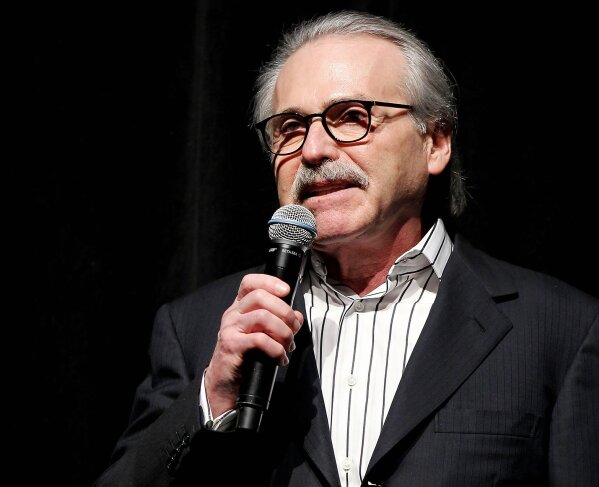
FILE - David Pecker, chairman and CEO of American Media, speaks at an event, Jan. 31, 2014 in New York. Pecker is The National Enquirer’s former publisher and a longtime friend of Donald Trump. Prosecutors say he met with Trump and Trump’s former lawyer Michael Cohen at Trump Tower in August 2015 and agreed to help Trump’s campaign identify negative stories about him. (Marion Curtis via AP, File)
▶ Read more about David Pecker and other key players in Trump’s hush money trial
Blanche concluded by urging jurors to pay attention to all of the testimony and to use common sense, observing, “We’re all New Yorkers here.”
“If you do that, there will be a very swift not guilty verdict,” Blanche said.
Court subsequently took a break and Trump left the courtroom without speaking to reporters in the hallway.
Blanche emphasized that although prosecutors described the allegations in their opening as a conspiracy, they didn’t actually charge Trump with conspiring.
“There’s nothing illegal about what you will hear happened among the National Enquirer, AMI, David Pecker and Donald Trump,” Blanche said, adding: “It’s not a scheme, unless a scheme means something that doesn’t matter, that’s not illegal.”
“I will say one other thing about Ms. Daniels’ testimony: It doesn’t matter,” Blanche said, explaining that she had no awareness about how the payments to Cohen were logged. “Her testimony, while salacious, does not matter,” he said.
Daniels has made “hundreds of thousands of dollars” since her allegations against Trump became public, Blanche said. She wrote a book, starred in a documentary and gained fame. At the same time, he noted, courts have sided with Trump in legal disputes with Daniels and that she owes him a substantial sum of cash.
As expected, Blanche is providing an extensive account of Cohen’s criminal record and his history of lying under oath. He said that Cohen turned against Trump only after he was not given a job in the administration and found himself in legal trouble.
Blanche accused Cohen of being “obsessed with President Trump,” saying “his entirely financial livelihood depends on President Trump’s destruction.”
“You cannot make a serious decision about President Trump relying on the words of Michael Cohen,” Blanche said.
While arguing that Trump did nothing illegal when his company recorded the checks to Cohen as legal expenses — prosecutors say they were veiled reimbursements meant to cover up Cohen’s payments to Daniels — Blanche is also challenging the notion that Trump agreed to the Daniels payout to safeguard his campaign.
Acknowledging that the money did change hands close to the election, Blanche characterized the transaction as the then-candidate trying to squelch a “sinister” effort to embarrass him and his loved ones. “President Trump fought back, like he always does, and like he’s entitled to do, to protect his family, his reputation and his brand, and that is not a crime,” Blanche told jurors.
Blanche took particular issue with the prosecution’s insinuation that attempting to influence an election connotes illegality. “I have a spoiler alert: There’s nothing wrong with trying to influence an election. It’s called democracy,” Blanche said. “They put something sinister on this idea, as if it’s a crime. You’ll learn it’s not.”
Blanche portrayed the ledger entries at issue in the case as pro forma actions performed by a Trump Organization functionary. Trump “had nothing to do” with the invoice, the check being generated or the entry on the ledger, Blanche said.
While prosecutors allege Trump reimbursed Michael Cohen $420,000 — more than double what Cohen paid to Daniels — because the cover-up was crucial to the campaign, Blanche said the excess payments are proof that Trump had nothing to do with the scheme.
“Ask yourself, would a frugal businessman, a man who pinches pennies, repay a 130,000 debt to the tune of $420,000?” Blanche asked.
“President Trump had nothing to do with any of the 34 pieces of paper, the 34 counts, except that he signed the checks, in the White House, while he was running the country.”
In the prosecution’s openings, Donald Trump was referred to as “the defendant.” But his own lawyers are referring to him as “President Trump.”
“We will call him President Trump, out of respect for the office that he held,” Blanche said.
Other Trump lawyers have used the same language in previous legal cases.
Trump’s lawyer Todd Blanche began, “President Trump is innocent. President Trump did not commit any crimes. The Manhattan district attorney’s office should never have brought this case.”
“He’s, in some ways, larger than life. But he’s also here in this courtroom, doing what any of us would do: defending himself,” Blanche said as Trump looked on with interest. He went on to describe Trump as a former president but also an everyday person — a man, a husband, a father.
Next up, Trump’s defense attorney Todd Blanche.
Anticipating the defense’s likely attacks on their star witness, Colangelo is acknowledging Michael Cohen’s criminal record.
“I suspect the defense will go to great lengths to get you to reject his testimony precisely because it is so damning,” Cohen said.
“We will be very upfront about it,” he continued, adding that Cohen, “like other witnesses in this trial, has made mistakes.”
“You can credit Michael Cohen’s testimony despite those past mistake,” he adds.
The evidence will show Trump is a “very frugal businessman. He believed in pinching pennies” and watching every dollar, Colangelo said. “It’s all over every book he’s written.”
Yet, when it came to reimbursing Cohen, Trump paid him double. “This might be the only time it ever happened,” Colangelo said. Trump’s willingness to part with so much cash showed just how important it was to him to keep the hush money scheme under wraps, the prosecutor posited.
After the election, Trump invited Pecker to Trump Tower to thank him for his contribution to the campaign. He also invited the publisher to the inauguration and later to the White House, where a dinner was held to honor Pecker and then-National Enquirer editor Dylan Howard.
But Colangelo said Trump still had a few “loose ends” to tie up, including reimbursing Cohen for the payments he had given to Daniels.
“Neither Trump nor the Trump Organization could just write a check to Cohen with a memo line that said ‘reimbursement for porn star pay-off,’” Colangelo said. “So they agreed to cook the books and make it look like the payment was actually income, payment for services rendered.”
Within days of the “Access Hollywood” tape becoming public, Colangelo told jurors that The National Enquirer alerted Cohen that porn actor Stormy Daniels was agitating to go public with her claims of a sexual encounter with Trump in 2006.
“At Trump’s direction, Cohen negotiated a deal to buy Ms. Daniels’ story to prevent American voters from hearing that story before Election Day,” Colangelo told jurors, referring to the scheme as a “conspiracy” and “election fraud, pure and simple.”
Colangelo told jurors that The Washington Post’s publication of the 2005 “Access Hollywood” tape, where Trump was heard on a hot mic “bragging about sexual assaults,” “was immediate and explosive.”
Colangelo told jurors that prominent Trump allies withdrew their endorsements and condemned his language. The prosecutor said evidence will show the Republican National Committee even considered whether it was possible to replace Trump with another candidate.
As Colangelo read aloud words from the tape, Trump showed no reaction.
For the first time in history, prosecutors are presenting a criminal case against a former American president to a jury as they accuse Donald Trump of a hush money scheme aimed at preventing damaging stories about his personal life from being public. (AP Video: David R. Martin)
Speaking of the arrangements made to pay former Playboy model Karen McDougal $150,000 to suppress her claims of a nearly year-long affair with the married Trump, Colangelo said Trump “desperately did not want this information ... become public because he was worried about its effect on the election.”
Colangelo told jurors they would hear a recording Cohen made in September 2016 of himself briefing Trump on the plan to buy McDougal’s story. The recording was made public in July 2018. Colangelo told jurors they would hear Trump in his own voice, saying, “What do we got to pay for this? One-fifty?”
The plan was hatched at Trump Tower shortly after the then-presidential candidate had announced his candidacy, what Colangelo is referring to as the “Trump Tower conspiracy.”
During that meeting, prosecutors say that David Pecker, then the publisher of the National Enquirer, agreed to “help the defendant’s campaign by working as the eyes and the ears of the campaign.”
All 18 jurors are looking directly at the veteran prosecutor, who stands at a lectern in the middle of the courtroom about halfway between them and Trump.
Colangelo, senior counsel to the district attorney, told jurors that though the payments to Michael Cohen, then Trump’s personal lawyer, were labeled as legal fees pursuant to a retainer agreement, there was no retainer and there were no legal services.
“The defendant was paying him back for an illegal payment to Stormy Daniels on the eve of the election. The defendant falsified those business records because he wanted to conceal his and others’ criminal conduct,” he said.
“The defendant, Donald Trump, orchestrated a criminal scheme to corrupt the 2016 presidential election. Then he covered up that criminal conspiracy by lying in his New York business records over and over and over again,” prosecutor Matthew Colangelo told jurors.
As the judge was giving jurors instructions about the trial, Trump’s campaign sent out a fundraising email to his supporters declaring, “THE HEARTLESS THUGS ARE FORCING ME TO SKIP MY SON’S GRADUATION!” and “THEY WANT TO RUIN MY LIFE!”
In reality, Judge Merchan has not yet ruled on the requests that court be adjourned on May 17 so the former president can attend his son Barron’s graduation, as well June 3 so one of the lawyers can attend their own child’s ceremony.
Merchan has previously said that he’s willing to adjourn for one or both days if the trial proceeds as planned. “It really depends on how we’re doing on time and where we are in the trial,” he said last week.
Without cameras in the courtroom, CNN is emulating websites by using one-third of its screen for a running live blog of what is going on in the trial, written by three correspondents in the courthouse.
Meanwhile, pundits on both CNN and MSNBC, previewing opening statements, compared it to a movie trailer, a preview of coming attractions. “So many times, movie trailers are better than the movies,” said MSNBC’s Jose Diaz-Balart.
While allowing for Trump — if he testifies — to be questioned to a limited extent about his recent civil business fraud trial and writer E. Jean Carroll’s defamation lawsuits against him, Merchan declined prosecutors’ requests to bring up two other legal cases.
One was the 2022 New York criminal tax fraud trial of Trump’s business, the Trump Organization. The company was convicted by a jury. Trump wasn’t charged in that case.
The other is the nearly $1 million fine that a federal judge in Florida last year ordered Trump and one of his attorneys to pay. The judge levied the penalty after finding that Trump filed a “completely frivolous” lawsuit against his 2016 rival Hillary Clinton and others.
Prior to the start of opening statements, the judge is giving jurors instructions about trial procedure, the burden of proof and other aspects of their role. The jurors looked on attentively.
Members of the jury have entered the courtroom. Trump turned in his seat and looked briefly in their direction.
“Good morning, jurors. We are about to proceed with the trial of the People of the State of New York v. Donald J. Trump,” said Judge Merchan.
Because the panel was selected over several days, this is the first time the full jury has been together. It’s also the first time jurors are seeing the courtroom packed with reporters, a departure from last week when the gallery was full of prospective jurors — or empty seats, as the groups were whittled down — and there were just a few reporters permitted inside.
Trump shook his head as Judge Merchan ruled that prosecutors could ask him about the outcome of his recent civil business fraud trial, in which another judge found that Trump, along with his business and key executives, fraudulently inflated his wealth on paperwork used to secure loans and insurance.
Merchan said prosecutors could challenge the former president’s credibility by questioning him about six legal determinations in four cases, including his $88.3 million in judgments for defaming writer E. Jean Carroll.
Strict limits will be placed on what prosecutors can question Trump about regarding those cases, including prohibiting them from eliciting the amounts of the monetary penalties imposed, said Merchan.
He will not allow them to show the actual video in court.
Trump’s lawyers object to the use of a transcript. But Merchan said that in his view there is “no reason” why a transcript of the video, where Trump boasted about grabbing women’s genitals without permission, “should not be admitted into evidence.”
An alternate juror has an emergency dental appointment this afternoon; court will adjourn at 12:30 p.m.
Before the juror’s tooth issue, Judge Merchan had previously planned to adjourn the trial at 2 p.m. because of Passover. He plans to end at 2 p.m. on Tuesday for the holiday.
Judge Merchan made the announcement after questioning the individual behind closed doors.
Judge Juan M. Merchan said his understanding was “that the juror was concerned about the media attention” to the case and wasn’t “100% sure they wanted to be here today.”
The juror did show up to court Monday and will be questioned further in the judge’s robing room, out of the view of the press, he said.
The former president filled his cheeks with air and exhaled before sitting down. Photographers quickly crowded around him, snapping photos ahead of the proceedings.
The gallery is packed with reporters, and the temperature in the courtroom is slightly warmer than on previous days, where the chill was a subject of much discussion.
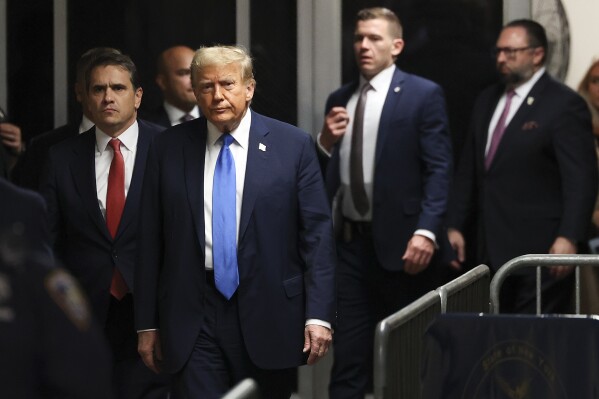
Former president Donald Trump leaves Trump Tower on his way to Manhattan criminal court, Monday, April 22, 2024, in New York. Opening statements in Donald Trump’s historic hush money trial are set to begin. Trump is accused of falsifying internal business records as part of an alleged scheme to bury stories he thought might hurt his presidential campaign in 2016. (AP Photo/Stefan Jeremiah)
Before heading into the courtroom, Trump addressed a camera in the hallway, once again saying that it’s “unfair” he has to be there, rather than out campaigning.
He once again cast the trial as a “witch hunt” and a “shame” aimed at damaging his campaign.
“I’m here instead of being able to be in Pennsylvania and Georgia and lots of other places campaigning and it’s very unfair,” he said.
Trump also spoke at length about another hearing taking place at a nearby court, regarding the $175 million bond he paid in his civil fraud case.
A small group of anti-Trump protesters was outside the courthouse ahead of opening statements, chanting, “No one is above the law,” while members of the media and public lined up to get inside.
Police had discussed the possibility of closing the park across the street, Collect Pond Park, after a man set himself on fire there last week, but on Monday it remained open to the public, including protesters.
He walked straight inside.
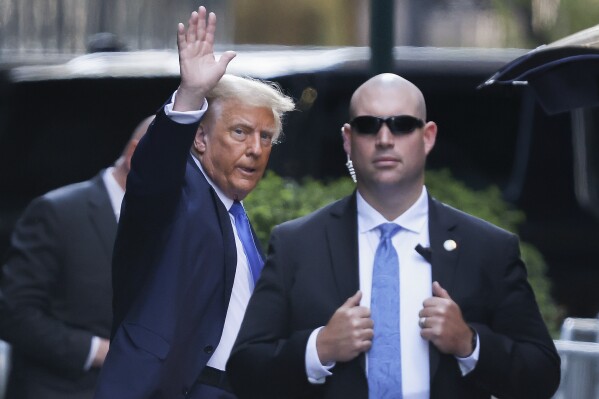
Former president Donald Trump leaves Trump Tower on his way to Manhattan criminal court, Monday, April 22, 2024, in New York. Opening statements in Donald Trump’s historic hush money trial are set to begin. Trump is accused of falsifying internal business records as part of an alleged scheme to bury stories he thought might hurt his presidential campaign in 2016. (AP Photo/Stefan Jeremiah)
After departing Trump Tower a little after 8:30 a.m., Trump is posting some of his most common refrains from Truth Social. “ELECTION INTERFERENCE!!!” he writes in one post. “WITCH HUNT!!!” in another.
Regulations limiting media coverage in courtrooms date back nearly a century, when the spectacle of bright flashbulbs and camera operators standing on witness tables during the 1935 trial of the man accused of kidnapping and killing Charles Lindbergh’s baby son horrified the legal community, according to a 2022 report by the New York-based Fund for Modern Courts.
Yet an interest in open government chipped away at these laws and — slowly, carefully — video cameras began to be permitted in courts across the country, often at the discretion of judges presiding in individual cases.
New York allowed them, too, on an experimental basis between 1987 and 1997, but they were shut down. Lobbyists for defense lawyers remain strong in New York and hold particular sway among lawyers in the state Assembly, said Victor Kovner, a former New York City corporation counsel who advocates for open courtrooms.
▶ Read more about why Trump’s trial isn’t televised and how it’s impacting media coverage.
The man who doused himself in an accelerant and set himself on fire outside the courthouse where former President Donald Trump is on trial has died, police said.
The New York City Police Department told The Associated Press early Saturday that the man was declared dead by staff at an area hospital.
The man was in Collect Pond Park around 1:30 p.m. Friday when he took out pamphlets espousing conspiracy theories, tossed them around, then doused himself in an accelerant and set himself on fire, officials and witnesses said.
A large number of police officers were nearby when it happened. Some officers and bystanders rushed to the aid of the man, who was hospitalized in critical condition at the time.
Person rushed away on a stretcher after fire extinguished outside Trump hush money trial
▶ Read more about the man who set himself on fire.
He seems “selfish and self-serving,” said one woman. The way he carries himself in public “leaves something to be desired,” said another.
His “negative rhetoric and bias,” said another man, is what is “most harmful.”
Over the past week, Donald Trump has been forced to sit inside a frigid New York courtroom and listen to a parade of potential jurors in his criminal hush money trial share their unvarnished assessments of him.
It’s been a dramatic departure for the former president and presumptive 2024 GOP nominee, who is accustomed to spending his days in a cocoon of cheering crowds and constant adulation.
Now a criminal defendant, Trump will instead spend the next several weeks subjected to strict rules that strip him of control over everything from what he is permitted to say to the temperature of the room.
“He’s the object of derision. It’s his nightmare. He can’t control the script. He can’t control the cinematography. He can’t control what’s being said about him,” said Tim O’Brien, a Trump biographer and critic.
“And the outcome could go in a direction he really doesn’t want,” he added.
▶ Read more about what prospective jurors said about Trump.
The allegations at the heart of this case don’t accuse Trump of an egregious abuse of power like the federal case in Washington charging him with plotting to overturn the 2020 presidential election, or of flouting national security protocols like the federal case in Florida charging him with hoarding classified documents.
But the New York prosecution has taken on added importance because it may be the only one of the four cases against Trump that reaches trial before the election. Appeals and legal wrangling have delayed the other three cases.
MICHAEL COHEN — Trump’s former lawyer and fixer. He was once a fierce Trump ally, but now he’s a key prosecution witness against his former boss. Cohen worked for the Trump Organization from 2006 to 2017. He later went to federal prison after pleading guilty to campaign finance violations relating to the hush money arrangements and other, unrelated crimes.
STORMY DANIELS — The porn actor who received a $130,000 payment from Cohen as part of his hush-money efforts. Cohen paid Daniels to keep quiet about what she says was a sexual encounter with Trump years earlier. Trump denies having sex with Daniels.
KAREN MCDOUGAL — A former Playboy model who said she had a 10-month affair with Trump in the mid-2000s. She was paid $150,000 in 2016 by the parent company of the National Enquirer for the rights to her story about the alleged relationship. Trump denies having sex with McDougal.

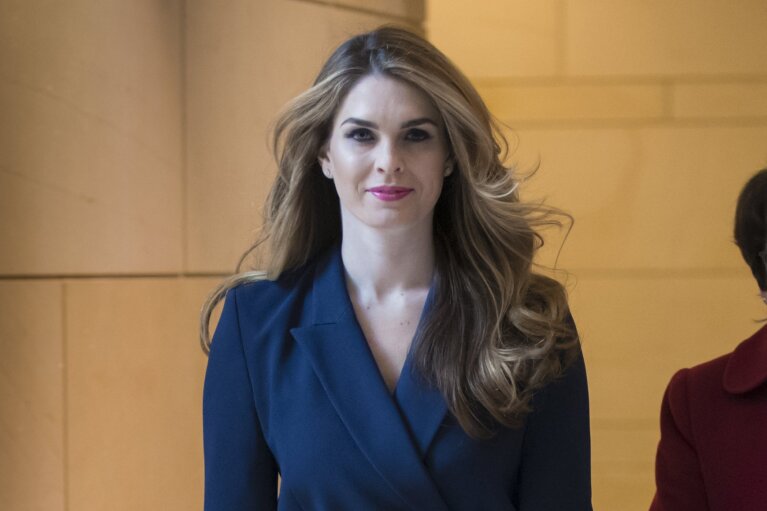
DAVID PECKER — The National Enquirer’s former publisher and a longtime Trump friend. Prosecutors say he met with Trump and Cohen at Trump Tower in August 2015 and agreed to help Trump’s campaign identify negative stories about him.
HOPE HICKS — Trump’s former White House communications director. Prosecutors say she spoke with Trump by phone during a frenzied effort to keep allegations of his marital infidelity out of the press after the infamous “Access Hollywood” tape leaked weeks before the 2016 election. In the tape, from 2005, Trump boasted about grabbing women without permission.
▶ Read more about the key players in Trump’s hush money trial.
Trump is charged with 34 felony counts of falsifying business records and could face four years in prison if convicted, though it’s not clear if the judge would seek to put him behind bars. A conviction would not preclude Trump from becoming president again, but because it is a state case, he would not be able to attempt to pardon himself if found guilty. He has repeatedly denied any wrongdoing.
Unfolding as Trump vies to reclaim the White House, the trial will require him to spend his days in a courtroom rather than the campaign trail. He will have to listen as witnesses recount salacious and potentially unflattering details about his private life.
Trump has nonetheless sought to turn his criminal defendant status into an asset for his campaign, fundraising off his legal jeopardy and repeatedly railing against a justice system that he has for years claimed is weaponized against him.
The final jurors have been seated in Donald Trump’s hush money trial and opening statements are set for Monday after an appellate judge rejected the former president’s latest bid to halt the case.
The case brought by Manhattan District Attorney Alvin Bragg revisits a chapter from Trump’s past when his celebrity past collided with his political ambitions and, prosecutors say, he sought to prevent potentially damaging stories from surfacing through hush money payments.
One such payment was a $130,000 sum that Michael Cohen, Trump’s former lawyer and personal fixer, gave to porn actor Stormy Daniels to prevent her claims of a sexual encounter with Trump from emerging into public shortly before the 2016 election.
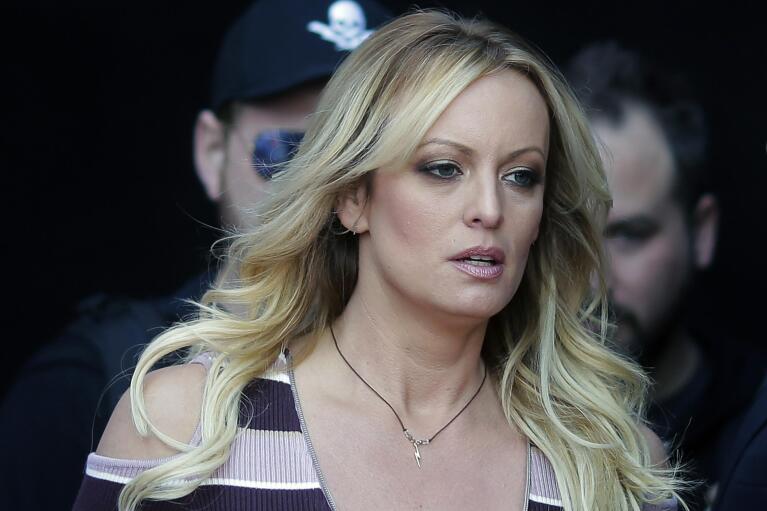
Prosecutors say Trump obscured the true nature of the payments in internal records when his company reimbursed Cohen, who pleaded guilty to federal charges in 2018 and is expected to be a star witness for the prosecution.
Trump has denied having a sexual encounter with Daniels, and his lawyers argue that the payments to Cohen were legitimate legal expenses.
To convict Trump of a felony, prosecutors must show he not only falsified or caused business records to be entered falsely, which would be a misdemeanor, but that he did so to conceal another crime.
For the first time in history, prosecutors will present a criminal case against a former American president to a jury as they accuse Donald Trump of a hush money scheme aimed at preventing damaging stories about his personal life from becoming public.
A 12-person jury in Manhattan is set to hear opening statements today from prosecutors and defense lawyers in the first of four criminal cases against the presumptive Republican nominee to reach trial.
The statements are expected to give jurors and the voting public the clearest view yet of the allegations at the heart of the case, as well as insight into Trump’s expected defense.
Court is scheduled to be back in session at 9:30 a.m. ET.

